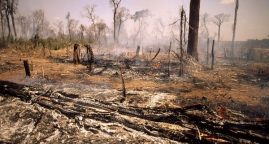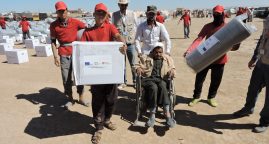World Disasters Report 2015
Focus on local actors; the key to humanitarian effectiveness
Local actors are often the most effective in conducting humanitarian operations. However, despite their critical role, they struggle to attract the funding and support they need.
The 2015 World Disasters Report – launched today by the International Federation of Red Cross and Red Crescent Societies (IFRC) – examines the complexities and challenges local actors face in scalingup and sustaining their humanitarian response.
Although widely recognized, the effectiveness of local or national humanitarian organizations is not reflected in humanitarian financing or coordination structures. The Report found, for example, that just 1.6 per cent of funding for humanitarian assistance is channeled directly to national and local NGOs. It presents the case for a shift towards the “localization” of aid and a more equal partnerships between international and local actors.
“Local actors are always the first to respond. In 2015, we saw local people and organizations at the centre of operations rescuing thousands trapped in the rubble after the earthquake in Nepal, setting up evacuation centres in the wake of Cyclone Pam in Vanuatu, and on the frontline of the protracted conflict in Syria,” said Elhadj As Sy, the Secretary General of the IFRC.
“But their effectiveness goes beyond their proximity. Local groups, including National Red Cross and Red Crescent Societies, are effective because of the perspective they bring, their understanding of language and cultural norms, and because they are permanently present in communities and able to
accompany them to address risks before disaster strikes.”
Read the article on the IFRC website
Related Articles
The Geopolitics of Environmental Challenges
03/02/2017. Much of the world seems to be on edge. But one issue – one might say the most significant of them all – is being ignored or pushed aside: the environment.
More than a tree …
Between 2008 and 2011, Malteser International has helped the community Kyae Taw planting almost 18,000 mangroves, protecting more than 3,000 residents of two villages.
Malteser International | Iraq: distribution of emergency kits for displaced people
06/06/2017. Distribution of emergency kits for displaced people






